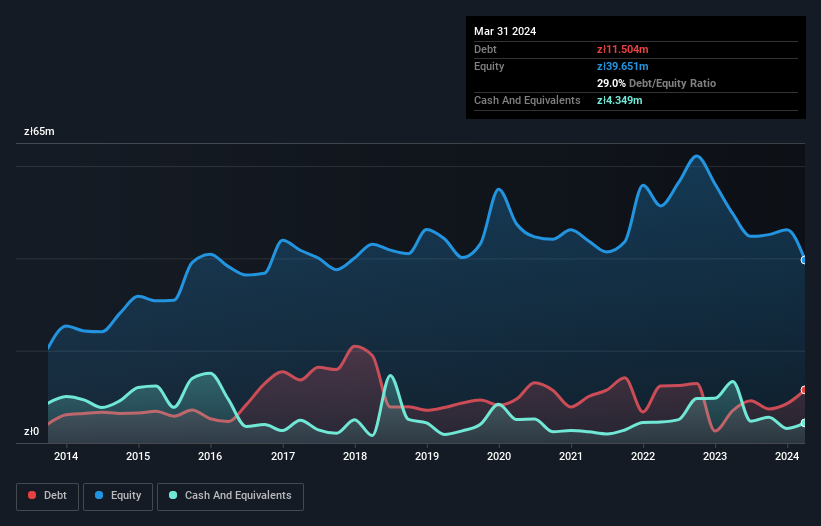
Legendary fund manager Li Lu (who Charlie Munger backed) once said, 'The biggest investment risk is not the volatility of prices, but whether you will suffer a permanent loss of capital.' It's only natural to consider a company's balance sheet when you examine how risky it is, since debt is often involved when a business collapses. Importantly, APS Energia SA (WSE:APE) does carry debt. But the more important question is: how much risk is that debt creating?
Why Does Debt Bring Risk?
Debt assists a business until the business has trouble paying it off, either with new capital or with free cash flow. If things get really bad, the lenders can take control of the business. However, a more common (but still painful) scenario is that it has to raise new equity capital at a low price, thus permanently diluting shareholders. Of course, the upside of debt is that it often represents cheap capital, especially when it replaces dilution in a company with the ability to reinvest at high rates of return. When we think about a company's use of debt, we first look at cash and debt together.
Check out our latest analysis for APS Energia
What Is APS Energia's Net Debt?
You can click the graphic below for the historical numbers, but it shows that as of March 2024 APS Energia had zł11.5m of debt, an increase on zł7.02m, over one year. On the flip side, it has zł4.35m in cash leading to net debt of about zł7.16m.

How Healthy Is APS Energia's Balance Sheet?
Zooming in on the latest balance sheet data, we can see that APS Energia had liabilities of zł50.2m due within 12 months and liabilities of zł19.1m due beyond that. Offsetting these obligations, it had cash of zł4.35m as well as receivables valued at zł20.6m due within 12 months. So it has liabilities totalling zł44.4m more than its cash and near-term receivables, combined.
This deficit isn't so bad because APS Energia is worth zł77.8m, and thus could probably raise enough capital to shore up its balance sheet, if the need arose. But we definitely want to keep our eyes open to indications that its debt is bringing too much risk. There's no doubt that we learn most about debt from the balance sheet. But it is APS Energia's earnings that will influence how the balance sheet holds up in the future. So when considering debt, it's definitely worth looking at the earnings trend. Click here for an interactive snapshot.
Over 12 months, APS Energia made a loss at the EBIT level, and saw its revenue drop to zł128m, which is a fall of 10%. We would much prefer see growth.
Caveat Emptor
Not only did APS Energia's revenue slip over the last twelve months, but it also produced negative earnings before interest and tax (EBIT). Indeed, it lost zł3.5m at the EBIT level. Considering that alongside the liabilities mentioned above does not give us much confidence that company should be using so much debt. Quite frankly we think the balance sheet is far from match-fit, although it could be improved with time. Another cause for caution is that is bled zł10m in negative free cash flow over the last twelve months. So in short it's a really risky stock. The balance sheet is clearly the area to focus on when you are analysing debt. But ultimately, every company can contain risks that exist outside of the balance sheet. Case in point: We've spotted 2 warning signs for APS Energia you should be aware of, and 1 of them can't be ignored.
Of course, if you're the type of investor who prefers buying stocks without the burden of debt, then don't hesitate to discover our exclusive list of net cash growth stocks, today.
New: Manage All Your Stock Portfolios in One Place
We've created the ultimate portfolio companion for stock investors, and it's free.
• Connect an unlimited number of Portfolios and see your total in one currency
• Be alerted to new Warning Signs or Risks via email or mobile
• Track the Fair Value of your stocks
Have feedback on this article? Concerned about the content? Get in touch with us directly. Alternatively, email editorial-team (at) simplywallst.com.
This article by Simply Wall St is general in nature. We provide commentary based on historical data and analyst forecasts only using an unbiased methodology and our articles are not intended to be financial advice. It does not constitute a recommendation to buy or sell any stock, and does not take account of your objectives, or your financial situation. We aim to bring you long-term focused analysis driven by fundamental data. Note that our analysis may not factor in the latest price-sensitive company announcements or qualitative material. Simply Wall St has no position in any stocks mentioned.
About WSE:APE
APS Energia
Designs, produces, and sells uninterruptible power supply systems for the production, heating, industry, telecommunications, medicine, and other sectors worldwide.
Low with imperfect balance sheet.
Market Insights
Community Narratives




